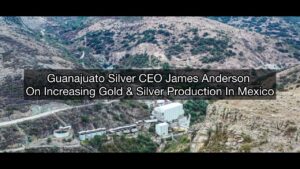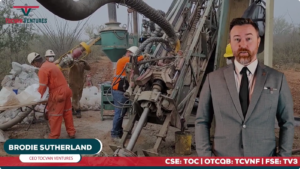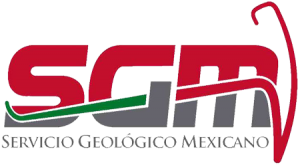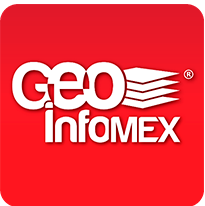Alamos Gold Inc. (TSX:AGI)(NYSE:AGI) (“Alamos”
or the “Company”) today reported its financial results for the
quarter ended
exploration and development activities.
“Production of 37,000
ounces in the first quarter of 2014 was consistent with our expectations, and
total cash costs of
of
challenging gold price environment, we remain among the lower cost producers
having another strong quarter of cash flow generation with operating cash flow,
before changes in non-cash working capital of
said
Officer.
“Underground development
is progressing on schedule at
Carlos
grade production ramps up. With the 43% increase in the underground reserve
grade at
that we recently announced, we are excited about the potential of this deposit
to supply the next four years of high grade mill feed. We continue to advance
our peer leading development pipeline and with
cash and no debt, we are well positioned to not only internally fund our
development initiatives, but also pursue accretive acquisitions,” Mr.
McCluskey added.
First Quarter 2014
Highlights
Financial Performance
- Realized
quarterly earnings of$2.7 million ($0.02
per share) compared to earnings of$26.0 million ($0.21
per share) in 2013. Generated cash from operating activities before
changes in non-cash working capital of$15.9 million ($0.13
per share); after changes in non-cash working capital of$7.3 (
million$0.06 per share) - Sold
32,161 ounces of gold at an average realized price of$1,291
per ounce for quarterly revenues of$41.5 million - Reported
cash and cash equivalents and short-term investments of$409.9 as at
millionMarch 31, 2014 - Declared
a semi-annual dividend of$0.10 per common share,
maintaining the dividend level despite a substantially lower gold price
environment. The dividend is payable onApril 30, 2014 to
shareholders of record as of the close of business onApril 15, 2014
- Repurchased
and cancelled 351,500 common shares under the Company’s Normal Course
Issuer Bid at a total purchase price of$3.2 million
Operational Performance
- Produced
37,000 ounces of gold at total cash costs of$617 per ounce
of gold sold, 12% below the low end of the 2014 guidance range of$700 per ounce
to $740 - Successfully
transitioned from owner-operated to contract mining at the Mulatos mine in
February 2014 - Depleted
the open pit Escondida high grade zone and commenced underground mining of
the Escondida Deep deposit - All-in
sustaining costs (which include total cash costs, exploration, corporate
and administrative, share based compensation and sustaining capital costs)
of$908 per ounce of gold sold, were below 2014 annual
guidance of between$960 and $1,000 - Reported
updated mineral reserves and resources as atDecember 31, 2013 ,
including a 43% increase in the grade of underground Proven and Probable
mineral reserves atSan to 7.0 g/t Au, and a 31% increase in Measured and
Carlos
Indicated mineral resources across all of the Company’s projects, despite
lower gold price assumptions used in calculating both mineral reserves and
resources - Appointed
Mr.David Fleck to the Alamos Board of Directors
effectiveMarch 10, 2014
Subsequent to quarter-end:
- Commenced
underground development ofSan in anticipation of high-grade production from this
Carlos
deposit in the second half of 2014
Q1 | Q1 | Change | |
Ounces produced | 37,000 | 55,000 | (33%) |
Ounces sold | 32,161 | 53,000 | (39%) |
Operating Revenues (000) | $ | $ | (52%) |
Earnings before income taxes (000) | $ | $ | (88%) |
Earnings (loss) (000) | $ | $ | (89%) |
Earnings (loss) per share (basic | $ | $ | (90%) |
Cash flow from operating | $ | $ | (61%) |
Cash flow from operating | $ | $ | (78%) |
Cash and short-term investments | $409,904 | $373,274 | 10% |
Realized gold price per ounce | $ | $ | (21%) |
Average London PM Fix gold price | $ | $ | (21%) |
Total cash cost per ounce (1) | $ | $ | 37% |
All-in sustaining cost per ounce (1) | $ | $ | 31% |
All-in cost per ounce (1) | $ | $ | 29% |
(1) | “Total cash cost per |
(2) | Cash and short-term investments |
First Quarter 2014
Financial Results
The Company continued to
generate strong operating margins in the first quarter of 2014 despite a
substantial decrease in the gold price from the corresponding period of the
previous year, as low cash costs allowed the Company to generate
million
(before changes in non-cash working capital). Cash from operating activities of
relative to the same period of 2013 as a result of lower gold sales.
Earnings before income
taxes in the first quarter of 2014 were
per share, compared to
basic share in the first quarter of 2013. On an after-tax basis, the Company
recorded earnings in the first quarter of 2014 of
or
in the same period of 2013 as a result of lower gold sales.
Capital expenditures in the
first quarter of 2014 totalled
in
first quarter of 2014 included
to installation of a new reclaim tunnel,
component changes,
and
to the water treatment plant. Sustaining capital of
was in line with annual guidance of
In addition, the Company
invested
focused on development activities at Escondida Deep,
Carlos
commenced mining from the El Victor open pit and plans to begin underground
mining at
in the third quarter of 2014. In order to ensure timely access to high grade
ore at
underground development has focused on widening access within a 150 m tunnel
that was part of the historic mine workings. Separate underground mine access
will be developed over the second and third quarters of 2014 and construction
of the bridge over the Mulatos river is underway and on schedule for completion
prior to the onset of the rainy season in July.
Key financial highlights
for the three-months ended
at the end of this release in Table 1. The unaudited interim consolidated
statements of financial position, comprehensive income, and cash flows for the
three-months ended
end of this release in Table 2.
First Quarter 2014
Operating Results
Gold production of 37,000
ounces in the first quarter of 2014 decreased 33% compared to 55,000 ounces in
2013. Lower gold production in the first quarter of 2014 relative to the first quarter
of 2013 was attributable to lower grades, throughput and recoveries. The
Company continued to benefit from a positive grade reconciliation relative to
the block model in the first quarter of 2014, with the grade of crushed ore
stacked on the leach pad of 1.03 g/t Au being 21% higher than the budgeted
annual grade of 0.85 g/t Au. This benefit was partially offset by lower than
anticipated grades mined and milled from the Escondida high grade zone of 3.28
g/t Au compared to the annual budget of 5.3 g/t Au.
Total crusher throughput in
the first quarter of 2014 averaged 16,800 tpd, 5% below the annualized budget
as a result of a planned four-day shutdown in January in order to move
infrastructure to accommodate a leach pad expansion. Backing out the four-day
planned shutdown, crusher throughput was 17,600 tpd, in line with budget.
In the first quarter,
tonnes mined and milled from the Escondida high grade zone averaged 500 tpd
before the zone was depleted in early March. Underground development of the Escondida
Deep deposit continued in the first quarter and production began ahead of
schedule at the end of March. Consistent with the earlier start and decrease in
the size of the underground mineral reserve at Escondida Deep to 32,000 tonnes
(as outlined in the 2013 mineral reserve update), the Company expects the mill
to operate below capacity during the second quarter of 2014 until the start of
underground ore production from
Carlos
High grade mill production
is expected to increase in the second half of 2014 relative to the first half
given expected higher grades from
Carlos
and negative ounce reconciliation encountered in the final quarters of the
Escondida high grade zone, attributable to the nugget effect in the deposit, is
not expected to recur at
Carlos
Carlos
more uniform grade distribution.
The annual budgeted grade
of the high grade mill feed of 5.3 g/t Au is based in part on the 2012 San
Carlos underground mineral reserve grade of 4.9 g/t Au. Given the 43% increase
in the
underground mineral reserve grade to 7.0 g/t Au in the recent 2013 update, the
Company is currently updating the
Carlos
grade ore from
will be available for mining and processing in 2014.
The ratio of ounces
produced to contained ounces stacked or milled (or recovery ratio) in the first
quarter was 71%, compared to 76% in the first quarter of 2013.
Cash operating costs of
per ounce of gold sold in the first quarter of 2014 were below the Company’s
annual guidance range of
higher than
2013. This increase is primarily attributable to lower grades mined and milled
in the first quarter of 2014 compared to 2013. Including royalties, total cash
costs were
2014.
Key operational metrics and
production statistics for the first quarter 2014 compared to the same period of
2013 are presented in Table 3 at the end of this press release.
Turkey Developments
In
the Company received an EIA Positive Decision Certificate for Kirazli from the
Ministry of the Environment and Urbanization
The Company’s EIA for Agi Dagi has been submitted and is currently under
review. In
(the “Court”) issued an injunction order regarding the Ministry’s
approval of the EIA for the Company’s Kirazli project, on the basis that the
report failed to assess the “cumulative impacts” of the Kirazli
project in conjunction with other potential mining projects in the region.
Given that there had not previously been any requirement to include such an
assessment in an EIA report, the Ministry is formally challenging the Court’s
decision to temporarily revoke the EIA approval on this basis. A hearing on the
merits of the underlying claim which led to the injunction took place on
17, 2014
In the interim, the Company is amending its EIA for the Kirazli project to
include an assessment of the potential cumulative impacts of proposed projects
in the region. The Court’s basis for the injunction did not relate to concerns
with any technical aspect of the Kirazli project.
Given that the Company is
already awaiting forestry and operating permits, and given the recent political
developments in
as well as federal elections upcoming during the year, the Company does not
expect the injunction to significantly alter its development timeline for the
Kirazli project.
The Company has budgeted
million
in 2014 for permitting, community and government relations and general
administration costs only. Given the continuing delay in receipt of key
permits, the Company has reduced its headcount and curtailed spending
significantly in
A full development budget for Kirazli and Agi Dagi will be re-initiated once
the required permits are received. The capital spending budget for these
projects is not expected to differ materially from the
preliminary feasibility study, with the exception that the devaluation of the
Turkish Lira would result in significant capital and operating savings that
would improve the overall project economics.
First Quarter 2014
Exploration Update
Total exploration expenditures
in the first quarter of 2014 were
primarily focused at Mulatos where exploration spending totalled
million
Escondida Deep and
Carlos
drilling costs at regional targets and administration costs, which were
expensed.
At Mulatos, up to 5 drill
rigs were active during the quarter primarily focused on opportunities at Mina
Vieja and
and further surface and underground definition drilling at Escondida Deep and
Carlos
Carlos
18% in terms of ounces and 43% in terms of grade,
Carlos
of the year. The drill program is expected to advance on a number of fronts in
an effort to convert existing mineral resources to mineral reserves and add new
mineral resources. Currently planned holes are designed to more closely define
existing resources, extend the strike and dip of existing resources and
specifically target high-grade structures.
Further, the Company
capitalized
gold project in the first quarter as development costs. These costs were
primarily related to the collection of baseline study data to support
resubmission of the EIA.
Outlook
Gold production in the
first quarter of 2014 of 37,000 ounces benefited from 21% higher grades from
the heap leach ore mined compared to the 2014 budget. Partially offsetting this
benefit were continued lower grades from the Escondida high grade zone for the
second consecutive quarter. The negative grade reconciliation experienced at
the open pit portion of the Escondida high grade zone may persist in the
Escondida Deep deposit, given its similar characteristics. Combined with the
smaller size of Escondida Deep as outlined in the 2013 mineral reserve update,
the Company expects that high grade production may continue to be below
expectations until the Escondida Deep deposit is depleted in the second
quarter.
Development at
Carlos
the third quarter of 2014. The Company does not expect similar grade
reconciliation issues at
Carlos
grade distribution. Rather, the potential for higher than budgeted grades mined
and milled from
exists given the recent mineral reserve update, which reflects a 43% increase
in grade at
to 7.0 g/t Au and an 18% increase in ounces to 210,000 relative to the prior
year update.
mill feed for a minimum of four years and the higher grades reported as part of
the reserve update are expected to positively impact high grade production and
operating costs over that time frame, relative to previous expectations. The
Company continues to evaluate opportunities to enhance the high grade
production outlook through optimizing mill recoveries and/or increasing
throughput.
The Company continues to
anticipate full year production of 150,000 to 170,000 ounces of gold, with the
majority of gold production to be in the second half of 2014 as underground
throughput rates at
Carlos
Looking beyond 2014, the
Company expects development of the
Pelon
cost production which will help drive annual production closer to the level
achieved in 2013. Both deposits are higher grade than Mulatos and could add
annualized production of between 60,000 and 70,000 ounces. The Company
continues the legal process to obtain the necessary surface rights to these
areas, which is expected to be resolved within 4 months. In the interim, the
Company is continuing negotiations with the land owners in an attempt to
resolve differences in value expectations. It is expected that permitting and
construction will take 18 months to complete after securing the necessary land
access rights.
Gold production from the
first of the Company’s Turkish projects, Kirazli, is expected within 18 months
of receipt of the outstanding forestry and operating permits. The Company
remains confident that these permits will be granted. However, recent legal
developments and political instability have increased uncertainty of the
expected timing for receipt of these permits. Accordingly, the Company has
implemented a cost reduction program in
pending further progress on permitting.
With the completion of the
and Orsa acquisitions in 2013, the Company has grown its development pipeline
substantially. Development spending at
in 2014 of approximately
work required for the resubmission of an EIA report and an internal feasibility
study to further support development of the project. Spending at the Quartz
Mountain Property will be focused on validating the existing mineral resources.
The Company continues to
strengthen its financial position, generating free cash flow from Mulatos in
the first quarter of 2014 with approximately
cash and cash equivalents and no debt. The Company`s development capital and
exploration spending in 2014 is all expected to be financed from cash flow, and
the Company is well positioned to pursue accretive opportunities and to deliver
on its longer term growth objectives.
Associated
Documents
This press release should
be read in conjunction with the Company’s interim consolidated financial
statements for the three-month periods ended
31, 2013
(“MD&A”), which are available from the Company’s website, www.alamosgold.com, in the “Investor
Centre” tab in the “Reports and Financial Statements” section,
and on SEDAR (www.sedar.com) and EDGAR (www.sec.gov).
Reminder of First
Quarter 2014 Results Conference Call
The Company’s senior
management will host a conference call on
at
results and update operating, exploration, and development activities.
Participants may join the
conference call by dialling (416) 340-8527 or (877) 677-0837 for calls within
and
or via webcast at www.alamosgold.com.
A playback will be available
until
within
United States
archived at www.alamosgold.com.
About Alamos
Alamos is an established
Canadian-based gold producer that owns and operates the
in
exploration and development activities in
United States
committed to the highest standards of sustainable development. Alamos has
approximately
debt-free, and unhedged to the price of gold. As of
Alamos had 127,357,488 common shares outstanding (139,110,887 shares fully
diluted), which are traded on the TSX and
“AGI”.
The TSX and
have not reviewed and do not accept responsibility for the adequacy or accuracy
of this release.
Cautionary Note
No stock exchange,
securities commission or other regulatory authority has approved or disapproved
the information contained herein. This News Release includes certain
“forward-looking statements”. All statements other than statements of
historical fact included in this release, including without limitation
statements regarding forecast gold production, gold grades, recoveries,
waste-to-ore ratios, total cash costs, potential mineralization and reserves,
exploration results, and future plans and objectives of Alamos, are
forward-looking statements that involve various risks and uncertainties. These
forward-looking statements include, but are not limited to, statements with
respect to mining and processing of mined ore, achieving projected recovery
rates, anticipated production rates and mine life, operating efficiencies,
costs and expenditures, changes in mineral resources and conversion of mineral
resources to proven and probable reserves, and other information that is based
on forecasts of future operational or financial results, estimates of amounts
not yet determinable and assumptions of management.
Exploration results that
include geophysics, sampling, and drill results on wide spacings may not be
indicative of the occurrence of a mineral deposit. Such results do not provide
assurance that further work will establish sufficient grade, continuity,
metallurgical characteristics and economic potential to be classed as a
category of mineral resource. A mineral resource that is classified as
“inferred” or “indicated” has a great amount of uncertainty
as to its existence and economic and legal feasibility. It cannot be assumed
that any or part of an “indicated mineral resource” or “inferred
mineral resource” will ever be upgraded to a higher category of resource.
Investors are cautioned not to assume that all or any part of mineral deposits
in these categories will ever be converted into proven and probable reserves.
Any statements that express
or involve discussions with respect to predictions, expectations, beliefs,
plans, projections, objectives, assumptions or future events or performance
(often, but not always, using words or phrases such as “expects” or
“does not expect”, “is expected”, “anticipates”
or “does not anticipate”, “plans”, “estimates” or
“intends”, or stating that certain actions, events or results
“may”, “could”, “would”, “might” or
“will” be taken, occur or be achieved) are not statements of
historical fact and may be “forward-looking statements.”
Forward-looking statements are subject to a variety of risks and uncertainties
that could cause actual events or results to differ from those reflected in the
forward-looking statements.
There can be no assurance
that forward-looking statements will prove to be accurate and actual results
and future events could differ materially from those anticipated in such
statements. Important factors that could cause actual results to differ materially
from Alamos’ expectations include, among others, risks related to international
operations, the actual results of current exploration activities, conclusions
of economic evaluations and changes in project parameters as plans continue to
be refined as well as future prices of gold and silver, as well as those
factors discussed in the section entitled “Risk Factors” in Alamos’
Annual Information Form. Although Alamos has attempted to identify important
factors that could cause actual results to differ materially, there may be
other factors that cause results not to be as anticipated, estimated or
intended. There can be no assurance that such statements will prove to be
accurate as actual results and future events could differ materially from those
anticipated in such statements. Accordingly, readers should not place undue
reliance on forward-looking statements.
Note to U.S.
Investors
Alamos prepares its
disclosure in accordance with the requirements of securities laws in effect in
which differ from the requirements of U.S. securities laws. Terms relating to
mineral resources in this presentation are defined in accordance with National
Instrument 43-101 – Standards of Disclosure for Mineral Projects under the
guidelines set out in the
and Petroleum Standards on Mineral Resources and Mineral Reserves.
United States Securities and Exchange Commission
permits mining companies, in their filings with the
only those mineral deposits that a company can economically and legally extract
or produce. Alamos may use certain terms, such as “measured mineral
resources”, “indicated mineral resources”, “inferred
mineral resources” and “probable mineral reserves” that the
does not recognize (these terms may be used in this presentation and are
included in the public filings of Alamos, which have been filed with the
and the securities commissions or similar authorities in
Cautionary non-GAAP
Measures and Additional GAAP Measures
Note that for purposes of
this section, GAAP refers to IFRS. The Company believes that investors use
certain non-GAAP and additional GAAP measures as indicators to assess gold
mining companies. They are intended to provide additional information and should
not be considered in isolation or as a substitute for measures of performance
prepared with GAAP. Non-GAAP and additional GAAP measures do not have a
standardized meaning prescribed under IFRS and therefore may not be comparable
to similar measures presented by other companies.
(i) | Cash flow from operating |
“Cash flow from
operating activities before changes in non-cash working capital” is a
non-GAAP performance measure that could provide an indication of the Company’s
ability to generate cash flows from operations, and is calculated by adding
back the change in non-cash working capital to “Cash provided by (used in)
operating activities” as presented on the Company’s consolidated statements
of cash flows.
The following table
reconciles the non-GAAP measure to the consolidated statements of cash flows.
Q1 | Q1 | |
Cash flow from operating | $7,265 | $32,750 |
Changes in non-cash working | 8,674 | 7,657 |
Cash flow from operating | $15,939 | $40,407 |
(ii) | Mining cost per tonne of ore |
“Mining cost per tonne
of ore” and “Cost per tonne of ore” are non-GAAP performance
measures that could provide an indication of the mining and processing
efficiency and effectiveness of the mine. These measures are calculated by dividing
the relevant mining and processing costs and total costs by the tonnes of ore
processed in the period. “Cost per tonne of ore” is usually affected
by operating efficiencies and waste-to-ore ratios in the period. The following
table reconciles the non-GAAP measure to the consolidated statements of
comprehensive income
Q1 | Q1 | |
Mining and processing costs – IFRS | $17,546 | $18,959 |
Inventory adjustments and period | 4,407 | 867 |
Total cost (000) | $21,953 | $19,826 |
Tonnes Ore stacked / milled (000) | 1,514 | 1,614 |
Total cost per tonne of ore | $14.50 | $12.28 |
(iii) | Cash operating costs per ounce and |
“Cash operating costs
per ounce” and “total cash costs per ounce” as used in this
analysis are non-GAAP terms typically used by gold mining companies to assess
the level of gross margin available to the Company by subtracting these costs
from the unit price realized during the period. These non-GAAP terms are also
used to assess the ability of a mining company to generate cash flow from
operations. There may be some variation in the method of computation of
“cash operating costs per ounce” as determined by the Company
compared with other mining companies. In this context, “cash operating
costs per ounce” reflects the cash operating costs allocated from
in-process and dore inventory associated with ounces of gold sold in the
period. “Cash operating costs per ounce” may vary from one period to
another due to operating efficiencies, waste-to-ore ratios, grade of ore
processed and gold recovery rates in the period. “Total cash costs per
ounce” includes “cash operating costs per ounce” plus applicable
royalties. Cash operating costs per ounce and total cash costs per ounce are
exclusive of exploration costs.
The following table
reconciles these non-GAAP measure to the consolidated statements of
comprehensive income.
Q1 | Q1 | |
Mining and processing costs – IFRS | $17,546 | $18,959 |
Divided by: Gold ounces sold | 32,161 | 53,000 |
Total Cash operating costs per | $546 | $358 |
Mining and processing costs – IFRS | $17,546 | $18,959 |
Royalties – IFRS (000) | 2,305 | 4,822 |
Total Cash costs (000) | $19,851 | $23,781 |
Divided by: Gold ounces sold | 32,161 | 53,000 |
Total Cash costs per ounce | $617 | $449 |
(iv) | All-in sustaining cost per ounce |
Effective 2013, in
conjunction with a non-GAAP initiative being undertaken by the gold mining
industry, the Company is adopting an “all-in sustaining cost per
ounce” non-GAAP performance measure. The Company believes the measure more
fully defines the total costs associated with producing gold; however, this
performance measure has no standardized meaning. Accordingly, there may be some
variation in the method of computation of “all-in sustaining cost per
ounce” as determined by the Company compared with other mining companies.
In this context, “all-in sustaining cost per ounce” reflects total
mining and processing costs, corporate and administrative costs, exploration
costs, sustaining capital, and other operating costs. Sustaining capital expenditures
are expenditures that do not increase annual gold ounce production at a mine
site and excludes all expenditures at the Company’s development projects as
well as certain expenditures at the Company’s operating sites that are deemed
expansionary in nature.
The following table
reconciles these non-GAAP measures to the consolidated statements of
comprehensive income.
Q1 | Q1 | |
Mining and processing costs (000) | $17,546 | $18,959 |
Royalties (000) | 2,305 | 4,822 |
Corporate and administration (000) | 3,534 | 7,257 |
Share-based compensation (000) | (784) | (785) |
Exploration costs (000) (2) | 2,973 | 2,072 |
Reclamation cost accretion (000) | 341 | 250 |
Sustaining capital expenditures | 3,288 | 4,122 |
$29,203 | $36,697 | |
Divided by: Gold ounces sold | 32,161 | 53,000 |
All-in sustaining cost per ounce | $908 | $692 |
(1) | Excludes corporate and |
(2) | Excludes exploration associated |
(v) | All-in cost |
Effective 2013, in
conjunction with a non-GAAP initiative being undertaken by the gold mining
industry, the Company is adopting an “all-in cost per ounce” non-GAAP
performance measure; however, this performance measure has no standardized
meaning. Accordingly, there may be some variation in the method of computation
of “all-in cost per ounce” as determined by the Company compared with
other mining companies. In this context, “all-in cost per ounce”
reflects total all-in sustaining cash costs, plus capital, operating, and
exploration costs associated with the Company’s development projects.
Q1 | Q1 | |
All-in sustaining cost (above) | $29,203 | $36,697 |
Add: Development and expansion | 4,921 | 7,532 |
Add: Other exploration (000) | 1,179 | 1,001 |
Add: Development project corporate | 550 | 579 |
35,853 | 45,809 | |
Divided by: Gold ounces sold | 32,161 | 53,000 |
All-in cost per ounce | $1,115 | $864 |
(vi) | Other additional GAAP measures |
Additional GAAP measures
that are presented on the face of the Company’s consolidated statements of
comprehensive income and are not meant to be a substitute for other subtotals
or totals presented in accordance with IFRS, but rather should be evaluated in
conjunction with such IFRS measures. The following additional GAAP measures are
used and are intended to provide an indication of the Company’s mine and
operating performance:
- Mine
operating costs – represents the total of mining
and processing, royalties, and amortization expense - Earnings
from mine operations – represents the amount of
revenues in excess of mining and processing, royalties, and amortization
expense. - Earnings
from operations – represents the amount of
earnings before net finance income/expense, foreign exchange gain/loss,
other income/loss, and income tax expense
Table 1: Financial Highlights |
Q1 | Q1 | |
Cash provided by operating | $15,939 | $40,407 |
Changes in non-cash working | ($8,674) | ($7,657) |
Cash provided by operating | $7,265 | $32,750 |
Earnings before income taxes (000) | $4,720 | $38,798 |
Earnings (000) | $2,746 | $25,989 |
Earnings per share | ||
– basic | $0.02 | $0.21 |
– diluted | $0.02 | $0.20 |
Comprehensive income (000) | $2,246 | $24,385 |
Weighted average number of common | ||
– basic | 127,483,000 | 126,675,000 |
– diluted | 127,499,000 | 126,938,000 |
Assets (000) (3) | $898,014 | $898,028 |
(1) | A non-GAAP measure calculated as |
(2) | Refer to “Cautionary non-GAAP |
(3) | Assets are shown as at March 31, |
Table |
ALAMOS GOLD INC. |
Consolidated Statements of |
(Unaudited – stated in thousands |
March | December | |
ASSETS | ||
Current Assets | ||
Cash and cash equivalents | $ | $ |
Short-term investments | 9,864 | 7,792 |
Available-for-sale securities | 1,384 | 1,896 |
Other financial assets | – | 442 |
Amounts receivable | 12,799 | 11,200 |
Advances and prepaid expenses | 8,610 | 9,068 |
Inventory | 44,458 | 37,972 |
Total Current Assets | 477,155 | $ |
Non-Current Assets | ||
Other non-current assets | 3,374 | 2,696 |
Exploration and evaluation assets | 215,727 | 214,387 |
Mineral property, plant and | 201,758 | 202,912 |
Total Assets | $ | $ |
LIABILITIES | ||
Current Liabilities | ||
Accounts payable and accrued | $ | $ |
Dividends payable | 12,736 | – |
Income taxes payable | 946 | 1,783 |
Total Current Liabilities | 36,072 | $ |
Non-Current Liabilities | ||
Deferred income taxes | 40,915 | 38,715 |
Decommissioning liability | 21,741 | 21,406 |
Other liabilities | 702 | 690 |
Total Liabilities | 99,430 | 86,081 |
EQUITY | ||
Share capital | $ | $ |
Warrants | 21,667 | 21,667 |
Contributed surplus | 24,596 | 24,236 |
Accumulated other comprehensive | (1,593) | (1,093) |
Retained earnings | 244,846 | 256,664 |
Total Equity | 798,584 | 811,947 |
Total Liabilities and Equity | $ | $ |
ALAMOS GOLD INC. |
Consolidated Statements of |
For the three-month periods ended |
March | March | |
OPERATING REVENUES | $ | $ |
MINE OPERATING COSTS | ||
Mining and processing | 17,546 | 18,959 |
Royalties | 2,305 | 4,822 |
Amortization | 11,384 | 12,935 |
31,235 | 36,716 | |
EARNINGS FROM MINE OPERATIONS | 10,276 | 49,556 |
EXPENSES | ||
Exploration | 1,435 | 788 |
Corporate and administrative | 4,084 | 7,836 |
Share-based compensation | (784) | (785) |
4,735 | 7,839 | |
EARNINGS FROM OPERATIONS | 5,541 | 41,717 |
OTHER INCOME (EXPENSES) | ||
Finance income | 719 | 683 |
Financing expense | (346) | (247) |
Foreign exchange loss | (311) | (3,330) |
Other loss | (883) | (25) |
EARNINGS BEFORE INCOME TAXES FOR | 4,720 | 38,798 |
INCOME TAXES | ||
Current tax recovery (expense) | 226 | (14,044) |
Deferred tax (expense) recovery | (2,200) | 1,235 |
EARNINGS FOR THE PERIOD | $ | $ |
Other comprehensive income (loss) | ||
– Unrealized loss on securities | (500) | (1,604) |
COMPREHENSIVE INCOME FOR THE | $ | $ |
EARNINGS PER SHARE | ||
– basic | $ | $ |
– diluted | $ | $ |
Weighted average number of common | ||
– basic | 127,483,000 | 126,675,000 |
– diluted | 127,499,000 | 126,938,000 |
(Unaudited – stated in thousands |
ALAMOS GOLD INC. |
Consolidated Statements of Cash |
For the three-month periods ended |
(Unaudited – stated in thousands |
March | March | ||
CASH PROVIDED BY (USED IN): | |||
OPERATING ACTIVITIES | |||
Earnings | $ | $ | |
Adjustments for items not | |||
Amortization | 11,384 | 12,935 | |
Financing expense | 346 | 247 | |
Unrealized foreign exchange loss | 410 | 3,132 | |
Deferred tax expense (recovery) | 2,200 | (1,235) | |
Share-based compensation | (784) | (785) | |
Other | (363) | 124 | |
Changes in non-cash working | |||
Amounts receivable | (2,315) | (4,845) | |
Inventory | (5,238) | (379) | |
Advances and prepaid expenses | 1,559 | 450 | |
Accounts payable and accrued | (2,680) | (2,883) | |
7,265 | 32,750 | ||
INVESTING ACTIVITIES | |||
Sales of securities | 835 | – | |
Short-term investments (net) | (2,072) | 47,654 | |
Contractor advances | (1,100) | – | |
Exploration and evaluation assets | (1,340) | (6,301) | |
Mineral property, plant and | (9,603) | (7,602) | |
(13,280) | 33,751 | ||
FINANCING ACTIVITIES | |||
Common shares issued | – | 167 | |
Shares repurchased and cancelled | (3,233) | – | |
(3,233) | 167 | ||
Effect of exchange rates on cash | (375) | 550 | |
Net increase in cash and cash | (9,623) | 67,218 | |
Cash and cash equivalents – | 409,663 | 306,056 | |
CASH AND CASH EQUIVALENTS – END OF | $ | $ | |
Table 3: Production Summary & |
Production summary | Q1 | Q1 | Change | Change |
Ounces produced (1) | 37,000 | 55,000 | (18,000) | (33%) |
Crushed ore stacked on leach pad | 1,483,500 | 1,568,900 | (85,400) | (5%) |
Grade (g/t Au) | 1.03 | 1.25 | (0.22) | (18%) |
Contained ounces stacked | 49,100 | 63,100 | (14,000) | (22%) |
Crushed ore milled (tonnes) | 30,100 | 45,600 | (15,500) | (34%) |
Grade (g/t Au) | 3.28 | 6.59 | (3.31) | (50%) |
Contained ounces milled | 3,200 | 9,700 | (6,500) | (67%) |
Ratio of total ounces produced to | 71% | 76% | (5%) | (7%) |
Total ore mined (tonnes) | 1,748,000 | 1,509,900 | 238,100 | 16% |
Waste mined (tonnes) | 950,000 | 702,000 | 248,000 | 35% |
Total mined (tonnes) | 2,698,000 | 2,211,900 | 486,100 | 22% |
Waste-to-ore ratio | 0.54 | 0.46 | 0.08 | 17% |
Ore crushed per day (tonnes) – | 16,800 | 17,900 | (1,100) | (6%) |
(1) | Reported gold production for Q1 |
(2) | Excludes mill tailings stacked on |
Contact Information:
(416) 368-9932 x 439
























